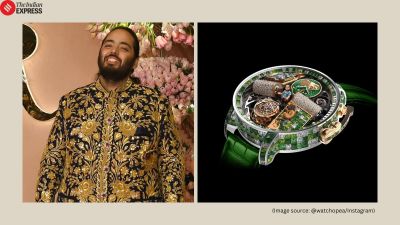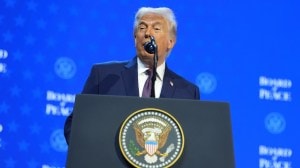A toast with Evian
The Indian response to an invitation from French President Jacques Chirac to travel to the Group of Eight G8 summit at Evian, France, and ...

The Indian response to an invitation from French President Jacques Chirac to travel to the Group of Eight G8 summit at Evian, France, and interact with G8 leaders was balanced and sober. Prime Minister Atal Behari Vajpayee deserves approbation for not getting carried away and repeatedly insisting that he was there representing a developing country. This is a very Chinese way of dealing with such situations. Despite China8217;s impressive economic performance, the Chinese leadership always insists that it is a developing country. We Indians tend to get carried away and often claim more greatness for ourselves than is warranted by our current global standing.
Hence, it was refreshing that the prime minister didn8217;t go to Evian as a pretender major power but deliberately emphasised our relative status and our role as a voice of the developing world. The emphasis in his speech on issues of common concern for the developing world would have been welcomed by other leaders from Asia, Africa and Latin America. Vajpayee8217;s forthright demand for a more open trading regime in which developed countries reduce domestic subsidies and non-tariff barriers and are more open to exports from developing country should have helped his hosts, the French government, understand the long distance they and the European Union have to travel to accommodate the economic interests of the developing world before they can hope to get them on board their project to build a multipolar world. If France and Germany truly want a multipolar world they must pursue economic policies that strengthen the developing world, not weaken it.
Vajpayee had two suggestions aimed at generating the resources required for development. First, the introduction of market-based user charges for the extraction of natural resources by multinational companies; and, second, the Tobin Tax on international capital flows, originally proposed by Nobel Prize-winning economist James Tobin. While the latter has lots of problems and cannot work unless every single country in the world is willing to be a party to it, the former is an eminently sensible idea. Interestingly, Vajpayee8217;s speech makes no reference to India. It would seem the prime minister saw himself representing a larger constituency of the world8217;s poor at the Evian Summit and not just his own people. His suggestion that the Evian format of a wider consultation between the developed and developing countries was a welcome innovation. Created over a quarter century ago, in the midst of a financial and energy crisis in the developed economies and against the background of intense business rivalry between Japan and the West, the G8 has little relevance today. A group without China, Brazil, South Africa and India and one including Canada and Italy appears lopsided in its composition. Hence, while Evian was still a meeting of the G8 with some others, next time round these summits should be between the largest industrial and industrialising nations, a G-16 if you like. Few global crises can today be dealt with successfully by just the G8 alone.
- 01
- 02
- 03
- 04
- 05































